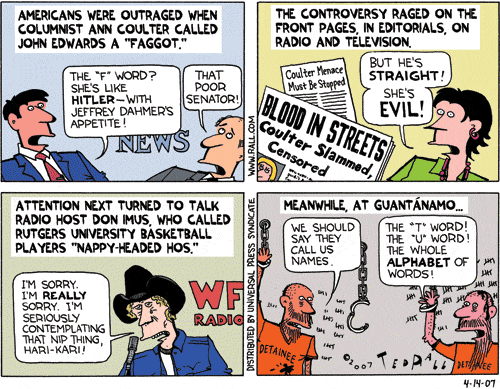Tuesday, April 24, 2007
WSJ: Fallujah Councilman Assassinated

Fallujah Councilman Assassinated
April 21, 2007 2:09 p.m.
BAGHDAD -- The chairman of Fallujah's city council, an outspoken critic of al Qaeda who took the job in the former Sunni insurgent stronghold after his three predecessors were assassinated, was killed in a drive-by shooting on Saturday, police said.
The assassination of Sami Abdul-Amir came as insurgents target Sunnis willing to cooperate with the U.S. and its Iraqi partners, particularly in Anbar, the volatile province that includes Fallujah, 40 miles west of Baghdad.
Police said the 65-year-old sheik was shot to death by attackers in a passing car as he was walking outside his home. His predecessor, Abbas Ali Hussein, was shot to death on Feb. 2.
Both men were critics of al Qaeda in Iraq, which is battling a growing number of Sunni tribes that have turned against it in a violent struggle for control of Anbar -- a center for anti-U.S. guerrillas since the uprising in Fallujah in 2004 that galvanized the insurgency. U.S. officials say tribal leaders and even some other insurgents are increasingly repelled by the group's brutality and religious extremism. The tribes also are competing with al Qaeda for influence and control over diminishing territory in the face of U.S. assaults.
Mr. Abdul-Amir was the only nominee to lead the 22-member council because the other potential candidates were afraid to take over the post, according to others on the panel. Some residents, who spoke on condition of anonymity because of security concerns, said they had warned Mr. Abdul-Amir not to take the job because of the dangers involved.
Gunmen also broke into the home of Najim Abdullah Suod, the city council chief who preceded Mr. Hussein, killing him and his 23-year-old son on Sept. 24, 2006, while Sheik Kamal Nazal was gunned down as he walked to work on Feb. 7, 2006.
In another attack on a top city official on Saturday, a roadside bomb killed the mayor of Musayyib, about 40 miles south of Baghdad, and one of his bodyguards, police said.
Separately, one American soldier was killed and two were wounded by a roadside bomb southwest of Baghdad, the military said. A separate roadside bombing, in Diwaniyah about 80 miles south of the capital, killed a Polish soldier late Friday.
Residents Upset About Baghdad Wall
In the capital, a wall U.S. troops are building around a Sunni enclave to protect its inhabitants from surrounding Shiites came under increasing criticism on Saturday, with residents calling it "collective punishment" and a local leader saying construction began without the neighborhood council's approval.
The U.S. military says the wall in Baghdad is meant to secure the minority Sunni community of Azamiyah, which "has been trapped in a spiral of sectarian violence and retaliation." The area, located on the eastern side of the Tigris River, would be completely gated, with entrances and exits manned by Iraqi soldiers, the U.S. military said earlier this week.
But some residents of the neighborhood complained that they had not been consulted in advance about the barrier. "This will make the whole district a prison. This is collective punishment on the residents of Azamiyah," said Ahmed al-Dulaimi, a 41-year-old engineer who lives in the area. "They are going to punish all of us because of a few terrorists here and there."
"We are in our fourth year of occupation and we are seeing the number of blast walls increasing day after day, suffocating the people more and more," Mr. Dulaimi said in an interview.
U.S. and Iraqi forces have long erected cement barriers around marketplaces and coalition bases and outposts in Baghdad and other Iraqi cities such as Ramadi in an effort to prevent attacks, including suicide car bombs. But the Azamiyah project appears to be the biggest effort ever to use a lengthy wall in Baghdad to break contact, and violence, between Sunnis and Shiites.
The U.S. strategy for stabilizing Iraq now involves persuading Iraqis to live in peace and support their democratically elected government and launching a security plan in the capital that calls for 28,000 additional American troops and thousands of Iraqi soldiers.
Khalid Ibrahim, 45, said the Americans were working hard to divide Baghdad's neighborhoods -- something he said he wasn't sure was a good thing.
"This is good if it is temporary, to help the area with security problems. But if this wall stays for the long term, it will be a catastrophe for the residents and will restrict our movements," said Mr. Ibrahim, an Azamiyah resident who works at the Interior Ministry.
The U.S. military says it began building the barrier April 10. AP Television News footage from the site on Saturday showed small concrete blocks, piles of dirt and coils of barbed wire on a main street. Eventually, the military said, the wall will be three miles long and include sections as tall as 12 feet.
Community leaders said Saturday that construction began before they had approved an American proposal for the wall.
"A few days ago, we met with the U.S. army unit in charge of Azamiyah and it asked us, as a local council, to sign a document to build a wall to reduce killing and attacks against Iraqi and U.S. forces," said Dawood al-Azami, the acting head of the Azamiyah council.
"I told the soldiers that I would not sign it unless I could talk to residents first. We told residents at Friday prayers, but our local council hasn't signed onto the project yet, and construction is already under way."
Copyright © 2007 Associated Press